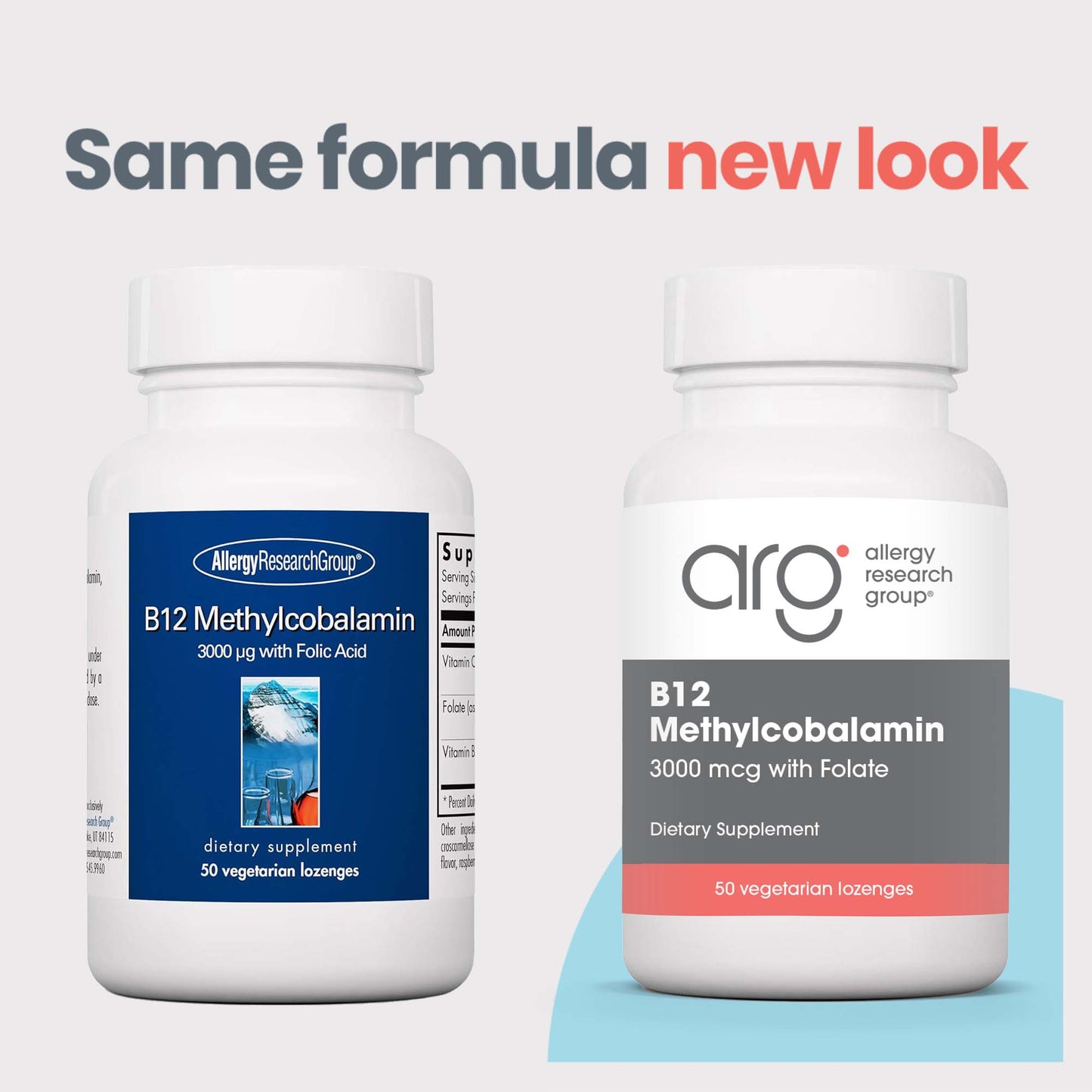









SKU:76560
B12 Methylcobalamin
B12 Methylcobalamin
3000 mcg with Folate
Product Description
B12 Methylcobalamin 3000 mcg with Folate is a high-potency formula providing methylated vitamin B12 with folate to support nerve health, red blood cell production, and homocysteine metabolism.* Methylcobalamin is the active form used in the brain and central nervous system and plays a role in neurotransmitter synthesis, myelin formation, and energy production.* Oral doses of 1,000 mcg and above are shown to be effective for maintaining healthy B12 levels.* Ideal for individuals with increased needs due to aging, medications, or dietary patterns, B12 Methylcobalamin 3,000 mcg offers safe, research-backed support for healthy cognition, mood, and methylation.*
Couldn't load pickup availability





-
Ingredients -
Product Information -
Suggested Use
Ingredients:
Supplement Facts
Serving Size: 1 lozenge
Servings Per Container: 50
Amount per Serving:
Vitamin C (as Ascorbic Acid): 50 mg
Folate (as 400 mcg Folic Acid): 667 mcg DFE
Vitamin B12 (as Methylcobalamin): 3000 mcg
Other Ingredients:
Fructose, Mannitol, Croscarmellose Sodium, Microcrystalline Cellulose, Stearic Acid, Magnesium Stearate, Silicon Dioxide, Natural Cherry Flavor, Natural Raspberry Flavor.
High-potency bioavailable methylcobalamin to support nerve health, cognitive function, and methylation balance.*
What It Does
B12 Methylcobalamin 3,000 mcg with Folate supports neurological health, red blood cell formation, and cellular energy by delivering a bioavailable, high-dose form of vitamin B12.* It promotes methylation, emotional well-being, and homocysteine regulation in lozenge form supported by 400 mcg of methylfolate and vitamin C.*
How It Works
• Methylcobalamin (Vitamin B12): The active, methylated form of B12 used in the central nervous system and involved in myelin sheath formation, neurotransmitter production, and cellular metabolism.*[1,4,8]
• Methylfolate: Works alongside B12 to support methylation, red blood cell production, and homocysteine metabolism.*[1]
• Homocysteine Balance: B12 facilitates the conversion of homocysteine to methionine, contributing to cardiovascular and cognitive health.*[6]
• Nerve Protection: Methylcobalamin supports myelin synthesis, essential for normal nerve signal transmission and neurological function.*[4,9]
• Mood and Cognition: B12 plays a role in the synthesis of neurotransmitters related to emotional regulation and mental clarity; insufficient levels may impact mood and cognition.*[3,8,10]
• Oral Absorption: Systematic reviews show oral doses of 1,000 mcg or more are effective compared to alternative administration.*[11]
• Low Toxicity: No tolerable upper intake level (UL) is established for B12 due to its safety profile and water-solubility, allowing the body to excrete excess amounts efficiently.*[12]
Who It’s For
This product is ideal for individuals with increased B12 needs due to dietary restrictions, aging, vitamin B-12 depleting medication use, or those seeking to support mood, cognition, and neurological function with a clinically supported dose.*
Special Features
Delivers 3,000 mcg of methylcobalamin per lozenge for reliable, high-potency support in a bioavailable format. Combined with folate to engage methylation and optimize homocysteine metabolism.*
B12 Methylcobalamin 3,000 mcg with Folate offers research-backed, high-dose neurological and metabolic support in one convenient daily lozenge.*
References
1. Baltrusch S. Biomed Res Int. 2021;2021:9968228. doi:10.1155/2021/9968228
2. Pawlak R, et al. Eur J Clin Nutr. 2014;68(5):541–8.
3. Lachner C, et al. J Neuropsychiatry Clin Neurosci. 2012;24(1):5–15.
4. Mumtaz H, et al. Ann Med Surg (Lond). 2022;82:104762. doi:10.1016/j.amsu.2022.104762
5. Infante M, et al. World J Diabetes. 2021;12(7):916–31.
6. Ueno A, et al. Nutrients. 2022;14(7):1494. doi:10.3390/nu14071494
7. Sangle P, et al. Cureus. 2020;12(10):e11169. doi:10.7759/cureus.11169
8. Syed EU, et al. Open Neurol J. 2013;7:44–8.
9. Calderon-Ospina CA, Nava-Mesa MO. CNS Neurosci Ther. 2020;26(1):5–13.
10. Beaudry-Richard A, et al. Ann Neurol. 2025. doi:10.1002/ana.27200
11. Wang H, et al. Cochrane Database Syst Rev. 2018;3(3):CD004655
12. Institute of Medicine. Dietary Reference Intakes. National Academies Press. 1998.
Suggested use:
As a dietary supplement, place 1 lozenge daily under tongue 30 seconds before swallowing, or as directed by a healthcare practitioner.
Warning:
If you are pregnant or lactating, have any health condition or are taking any medication, consult your healthcare practitioner before use.
Store in a cool, dry place, tightly capped, away from light. Keep out of the reach of children. Use only if safety seal is intact. Variations in product color may occur.
Stay Connected
Sign up and we’ll keep you up to date on the latest news, clinical education resources, product innovations and promotions.
